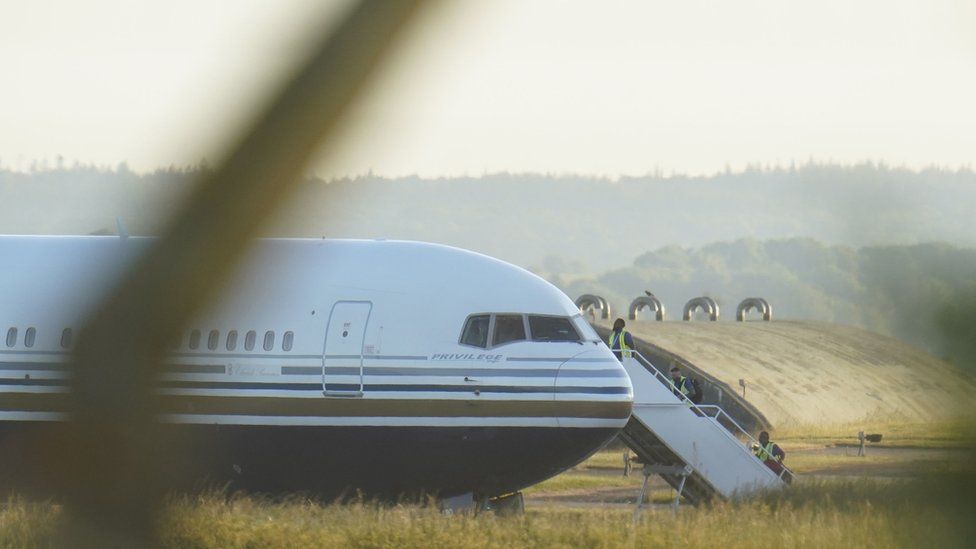ARTICLE AD BOX
By Dominic Casciani
Home and legal correspondent
 Image source, PA Media
Image source, PA Media
The first flight meant to take asylum seekers to Rwanda from the UK was cancelled amid legal challenges
UK ministers who backed sending asylum seekers to Rwanda were warned by their own adviser that its government tortures and kills political opponents.
The warning came weeks before the British government tried to send asylum seekers to the African nation.
The adviser raised concerns about the tone and accuracy of an official note on Rwanda's human rights record.
There is an ongoing legal challenge against government attempts to keep more of the comments secret.
Migrants, identified for the aborted flight, and three media organisations - BBC News, the Times and the Guardian newspapers - are seeking disclosure of the material.
The first Rwanda flight was grounded in June after the European Court of Human Rights said the High Court in London must first fully examine whether the removals policy is lawful. A hearing is scheduled for next month.
On Tuesday, the government asked the High Court to rule that the case should not include 11 specific comments about Rwanda from an unnamed Foreign Office (FCDO) official, who had been asked for their view.
The court heard that FCDO bosses had asked the unnamed official, who had some expertise in African affairs, to look at a draft of the Rwanda "Country Policy and Information Note".
This is an official and public document on the country and its human rights record - and it was being updated while the Rwanda flights plan was being thrashed out.
In an email sent to colleagues on 26 April - two weeks after the plan became public - the reviewer questioned the tone of the report and whether it accurately reflected the situation in the country.
High Court judge Lord Justice Lewis was told the official had written in a covering email: "There are state control, security, surveillance structures from the national level down... political opposition is not tolerated and arbitrary detention, torture and even killings are accepted methods of enforcing control too".
Jude Bunting QC, appearing for the media organisations, told the court the withheld evidence from the reviewer was likely to be the most critical material about the Rwanda affair.
"The sensitivity of this policy cannot be understated," he said.
"The public needs to understand the material that was available to the [government] at the time the decisions under challenge were taken, the evidence that is said to weigh against, as well as to justify, this flagship policy, and the reasons why the [government] decided to proceed."
Lord Justice Lewis will rule in the coming days on whether any of the material should be kept secret.
Last month the High Court heard that Whitehall officials had initially excluded Rwanda on human rights grounds from the list of potential partners for asylum transfers.
The court was told that Dominic Raab, the then-foreign secretary, had been warned that a deal with Rwanda would force the UK to constrain what it said to the nation about its record.
The pilot scheme would see those who arrived in the UK by what the government considers "illegal, dangerous or unnecessary" routes - such as in small boats or hidden in lorries - flown to the African country, where they could then claim asylum.
An upfront payment of £120m to Rwanda would be followed by further payments as the country handled more cases, the Home Office has said.
The government has said the "world-leading scheme" would help prevent dangerous Channel crossings and when announcing it Prime Minister Boris Johnson said it would "save countless lives" by stopping "vile people smugglers".
More than 13,000 people have made the crossing from France so far this year, with around 8,000 arriving since the Rwanda policy was launched.
After the first flight to Rwanda was cancelled Home Secretary Priti Patel said she would not be deterred from "doing the right thing" and told MPs she believed the policy was "fully compliant" with the law.
Many groups have criticised the plans, with refugee organisations branding it cruel, while the Church of England and opposition MPs have also hit out at it.

 2 years ago
59
2 years ago
59








 English (US) ·
English (US) ·